
Complex households in French Polynesia
What does the term “complex households” cover? What proportion of households in French Polynesia are “complex”?

What does the term “complex households” cover? What proportion of households in French Polynesia are “complex”?

Since 2000, 31 countries on every continent have passed legislation granting same-sex couples the right to marry. Australia was the 27th in 2017.

Generally speaking, couples tend to synchronize their sleep: the members of 4 out of 5 couples go to bed and get up at the same times. The sleep of retired couples, non-working couples under age 60, and relatively well-off working couples is fairly synchronized whereas relatively disadvantaged working couples’ sleep is desynchronized.
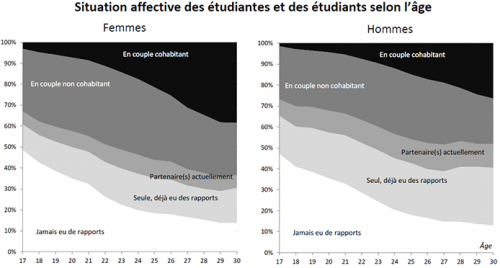
The student population is a privileged target in terms of prevention but also in terms of information on consent.

How do men and women divide domestic work since the introduction of the 35-hour reform?

Researchers have used ELFE study data (French longitudinal study of children) to examine the possible effects of paternity leave on partners’ sharing of parenting and domestic tasks.

This study, published in Population (2017-3) and based on the 2011 Families and Housing Survey.

Marriage has changed since the 1980s, as attested by the rise in cohabitation outside marriage: in 2011, nearly one in four couples in France were not married.

Heirs and heiresses often marry each other in France, finds a study published in the journal “Population.” Balzac’s Rastignac would have little chance of marrying a rich heiress today.

China, the world’s largest country in terms of population, is now a predominant player on the international economic and geopolitical stage.

Using data from the joint INED-INSEE “Parcours individuels et conjugaux” survey, researchers Wilfried Rault and Arnaud Régnier-Loilier compared the time it takes individuals in France to indicate their wedding date or the date they formalized their civil union by respondent’s sex; they also studied the individual and social meanings people associate with these events.

Si l’écart entre hommes et femmes diminue, cela résulte principalement d’une réduction du temps consacré par les femmes aux tâches ménagères.

With other variables controlled for, attending a crèche positively affects language acquisition, while having little effect on motor skill development or behavior.

The "Longitudinal study on access to autonomy after a placement" makes it possible for the first time in France to measure the living conditions of young people in care at the end of their care.

En l’espace de quelques années, le nombre de Pacs a augmenté au point de se rapprocher du nombre annuel de mariages. Wilfried Rault, chercheur à l’Ined, nous éclaire sur les grandes évolutions du Pacs depuis 20 ans.

Access to abortion around the world is highly unequal. In African and Latin American countries access may be restricted to particular causes of pregnancy or totally outlawed.

The ELFE study centres on childhood at this stage, then it is natural to have them communicate directly through computer games, an appropriate medium for their age and generation.

We commonly encounter two opposed discourses on love, Michel Bozon takes quite a different perspective.

Boys reach puberty at around 15 years—later than girls, who usually begin menstruating around age 13.

Since the law no. 2002-304 of 4 March 2002 applicable to children born since January 2005, parents can now choose between four options for their child’s family name

Mothers who share physical child custody with the child(ren)’s father after divorce or legal dissolution of their civil union are more likely to be working than mothers with residential custody

Angèle Jannot, a PHD student at INED, questions the influence of income and degree levels on wealth inequalities within parental couples.

La situation des femmes sur le marché du travail a connu une évolution radicale ces 50 dernières années

differences between male and female married couples

Objets de débat, les sites et les applications de rencontres sont accusés de rien de moins que d’avoir tué l’amour. Ces critiques illustrent la consternation et la réprobation suscitées par ce nouveau mode de rencontres. Sont-elles seulement fondées ?

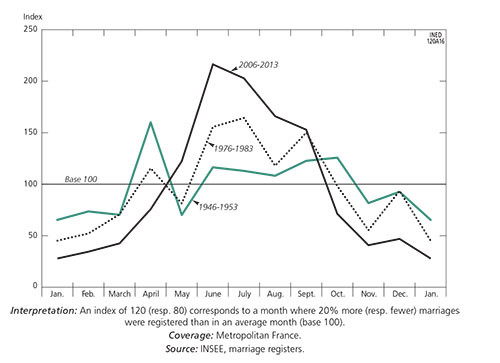
For the 70th anniversary of its founding, the journal Population has been republishing articles from its 1946 issues, each commented upon by present-day researchers.

By 2050 in China and India, the number of single men seeking to marry is expected to exceed the number of eligible women by over 50%. This suggests the degree of marriage market saturation.
At age 17, about half of French teenagers have experienced their first sexual intercourse. With a median age of 17.2 for women and of 16.4 for men in 2010, the gap between the sexes has narrowed to just a few months.

En 2022, l’avortement a pu être davantage mobilisé dans une période possiblement jugée peu propice à la décision d’accueillir un enfant
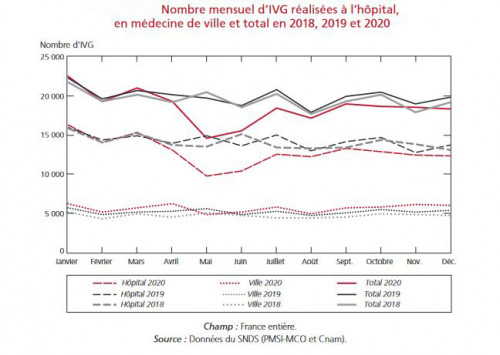
After rising in France in the years 2016-2019—230,000 abortions in 2019—induced abortions fell to slightly under 220,000 in 2020 (207,000 of them in metropolitan France), a decrease of 4% directly due to the health crisis.

Using data from the French national health insurance system now available to researchers, Khaoula Ben Messaoud, who has just defended her doctoral thesis, INED researcher Elise de La Rochebrochard, and INSERM epidemiologist Jean Bouyer were able to measure annual infertility treatment use in France.

In an article published in Population 2020-1, Nitzan Peri-Rotem analyses individual interactions between two major fertility determinants: education and religiosity or religious affiliation.

What metro line(s) show(s) the highest fertility rate in 2012 and the highest average age of mothers at baby’s birth?
A study by John Tomkinson, former PhD student at INED.
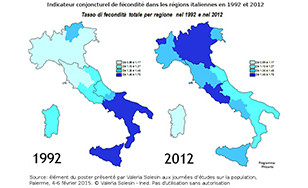
Around 63% of women of reproductive age who are married or in a union use a contraceptive method. The most widespread method worldwide is sterilization.

China, the world’s largest country in terms of population, is now a predominant player on the international economic and geopolitical stage.

Within Europe, France and Italy stand virtually opposed in terms of fertility: women in France have 2 children on average, as against 1.4 in Italy. The difference is explained in part by the fact that women in Italy have their first child at a later age

En 2021, l’âge moyen à la parentalité est de près de trois ans plus élevé chez les hommes

The fact that women have their first child at later ages does not account for lower fertility at the country level.

Consacrée à l’Afrique au Sud du Sahara (47 pays, 1,1 milliard d’habitants en 2020), la chronique parue en 2020 dans la revue Population 2020 2-3 propose à la fois une synthèse approfondie des grands changements sociodémographiques et sanitaires survenus dans la région entre 2000 et 2020 et un bilan statistique rassemblant les données récentes les plus fiables sur chaque pays.

"Premiers cris, premières nourritures" is an international-scale study of breastfeeding and weaning practices through the ages, from prehistory to the twenty-first century.

Fifty years ago, on 19 December 1967, in response to strong mobilization by the French Family Planning Movement, the parliamentarian Lucien Neuwirth persuaded the National Assembly to pass a law authorizing the sale and use of contraception methods in France.

Des différences d’âge dans les comportements de fécondité apparaissent entre hommes et femmes
In 2014, about 56 millions abortions were performed accross the world. Slightly under half were high-risk abortions.

The number of twin births in France has almost doubled in the last 40 years. Why? What are the effects?

France is the only Western country, apart from Luxembourg, Italy and the Czech Republic, where the law allows women to request that their identity be kept secret and withheld from their child’s birth certificate

Malgré leur remboursement, les femmes ayant de plus faibles revenus utilisent moins de contraceptifs que les autres

7 in 10 couples treated by IVF achieve parenthood, but not always through medical treatment.
Achieving parenthood through IVF remains difficult: 1 in 4 couples discontinue treatment after their first attempt (cycle).

The student population is a privileged target in terms of prevention but also in terms of information on consent.

Access to abortion around the world is highly unequal. In African and Latin American countries access may be restricted to particular causes of pregnancy or totally outlawed.

Becoming a parent while studying thus seems socially unthinkable, and the French educational system today does not really take account the fact that some students are parents.
In France, first menstruation or "menarche" occurs at around age 13. According to a survey conducted in 1994, half of all girls had already started menstruating at age 13. Most girls (9 out of 10) have their first period between ages 11 and 14.
On average, 105 boys are born for every 100 girls. However, in China, India and several other Asian and Caucasian countries, the proportion of newborn boys is abnormally high because couples practice sex-selective abortion.

The ECAF survey (Emergency Contraception in Africa) was conducted in 2006-2007 in three countries of West Africa-Senegal and Burkina Faso (French-speaking) and Ghana (English-speaking)-and the North African country of Morocco (French-speaking)

Since the law no. 2002-304 of 4 March 2002 applicable to children born since January 2005, parents can now choose between four options for their child’s family name

The increase in the number of centenarians since the end of the Second World War has been spectacular. From above 1,000 in France in 1970, their number grew to over 8,000 in 2000, and over 31,000 on 1 January 2024. Assuming that current mortality trends continue, INSEE projects that there will be more than 200,000 centenarians in France in 2070.

Malgré leur remboursement, les femmes ayant de plus faibles revenus utilisent moins de contraceptifs que les autres

En région comme au niveau national, des comportements démographiques encore marqués par la Covid-19

Consumption varies greatly depending on the family configuration

The research, led by Imperial College London and published in the journal Nature Medicine, analysed weekly death data from 21 industrialised countries between mid-February and end of May 2020.

The first study on mortality among second-generation immigrants in France reveals a large amount of excess mortality among North African-origin males

In 2011, 80% of persons aged 60 or older and at least partially dependent receive informal support from a family member.
The project about “Mortality among immigrants in France” was developed as part of a partnership between INED and the Population Study Center of the University of Pennsylvania (Penn). It is funded by the National Institutes of Health (NIH) for the period 2015-2019.

In France, suicide is seven times more frequent among prisoners than in the general population. Which inmates are most vulnerable?

According to UNAIDS estimates for the year 2012, 35.3 million persons are infected with the HIV virus worldwide and there were 2.3 million new infections and 1.6 million deaths that year.

What are the impacts of remote working on mental health and work-life balance? While there are several advantages to remote working, it can also have adverse effects on well-being, especially mental health.

En France, des disparités d’espérance de vie sans incapacité sont observées dans les territoires.

Using data from the French national health insurance system now available to researchers, Khaoula Ben Messaoud, who has just defended her doctoral thesis, INED researcher Elise de La Rochebrochard, and INSERM epidemiologist Jean Bouyer were able to measure annual infertility treatment use in France.

The department of Seine-Saint-Denis saw particularly high rates of excess mortality due or related to COVID-19 compared to the rest of metropolitan France.

No study has yet approached the question of how those health burdens are distributed across the different social strata of a single African city.

In an article published in Population (2017-3), Dominique Tabutin and Bruno Masquelier assess mortality trends since 1990.

Mortality fell considerably in the 20th century in western countries, but the decrease was neither regular nor continuous.
In the past, it was very common for babies to die before their first birthday. Today infant mortality in France is very low. In 2013, fewer than four newborns (3,5) in 1,000 died before the age of one.
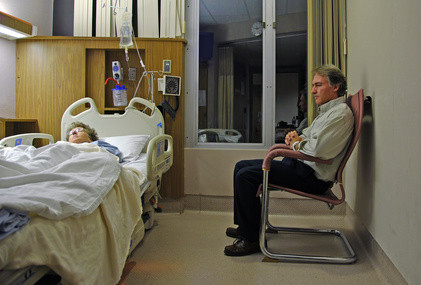
Although nearly 2 out of 3 people die in hospital, an analysis of trajectories during the last month of life gives a more nuanced picture.

En 2022, l’avortement a pu être davantage mobilisé dans une période possiblement jugée peu propice à la décision d’accueillir un enfant

The excess mortality observed from March 18 to May 19, 2020, at the start of the COVID-19 pandemic, was much higher among France’s foreign-born population groups than in the French-born population.
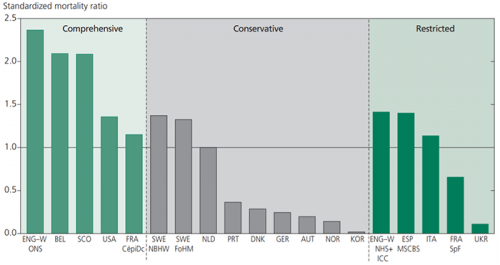
Each country set up its own counting system for Covid-19 mortality , which in turn evolved as the epidemic wore on, making it difficult to compare the mortality differences observed over time and space.

Consacrée à l’Afrique au Sud du Sahara (47 pays, 1,1 milliard d’habitants en 2020), la chronique parue en 2020 dans la revue Population 2020 2-3 propose à la fois une synthèse approfondie des grands changements sociodémographiques et sanitaires survenus dans la région entre 2000 et 2020 et un bilan statistique rassemblant les données récentes les plus fiables sur chaque pays.

La mortalité pour les principaux types de cancers évolue favorablement en France, mais à des rythmes très variés selon la localisation organique et selon le sexe.

Le numéro 3 de la revue Population de 2018 présente, dans son avant-propos, une analyse des inégalités de temps de survie chez les soldats "Morts pour la France" durant la Grande Guerre

Silicosis can only progress at fast pace, in relationship with the industrialization of emerging countries.

Overview and Current Knowledge
The mean length of life has more than tripled in France over the last two and a half centuries, from 25 years in 1740 to more than 80 years today.

Drawing on detailed data from France’s 1999 and 2015 population censuses, Julie Fromentin, a former PhD student at INED, analyzed how the composition of the immigrant population in rural and peri-urban areas of metropolitan France and in the country’s small towns evolved over that period.

Nearly half of women and slightly over a third of men aged 25 to 29 have a higher education degree

Mathieu Ichou’s analysis of the academic performances of immigrant’s children, who in France account for nearly one-fourth of pupils, gives us a new sociological perspective on this fundamental social concern.

It is frequently claimed that more and more migrations will result from environmental changes caused by global warming.


Très concentrée géographiquement, très féminine, la population d'immigrants chinois en France est en grande partie constituée d'étudiants.

The department of Seine-Saint-Denis saw particularly high rates of excess mortality due or related to COVID-19 compared to the rest of metropolitan France.
In April and May of 2015, the regional Île-de-France discrimination monitoring office together with INED and the iPSOS polling institute surveyed 2,500 people on their perceptions and experiences of discrimination.


French law permits dual nationality and does not require foreigners who obtain French nationality to give up their original one.

The excess mortality observed from March 18 to May 19, 2020, at the start of the COVID-19 pandemic, was much higher among France’s foreign-born population groups than in the French-born population.

The first study on mortality among second-generation immigrants in France reveals a large amount of excess mortality among North African-origin males
The project about “Mortality among immigrants in France” was developed as part of a partnership between INED and the Population Study Center of the University of Pennsylvania (Penn). It is funded by the National Institutes of Health (NIH) for the period 2015-2019.


The immigrant population of metropolitan France -that is, persons born non-French outside France-has been predominantly female for the last few years.

What does the term “complex households” cover? What proportion of households in French Polynesia are “complex”?

Si les jeunes entrent dans le dispositif à des âges très variés, tous doivent en revanche en sortir à 18 ans, âge de fin de la prise en charge légale, ou à 21 ans au plus tard s’ils obtiennent un contrat jeune majeur.

Drawing on INSEE’s Housing surveys, the authors analyze growing disparities in first home purchases among young households (couples aged 25-44) over the long period from 1973 to 2013 in metropolitan France.

It is frequently claimed that more and more migrations will result from environmental changes caused by global warming.

It is difficult to count people who have no home, especially if they have no place of shelter at all and are sleeping in the street. To learn more about them, INSEE and INED conducted several surveys with users of shelters and free meal services. The surveys have found a considerable increase in the number of homeless in France since 2001.

Drawing on detailed data from France’s 1999 and 2015 population censuses, Julie Fromentin, a former PhD student at INED, analyzed how the composition of the immigrant population in rural and peri-urban areas of metropolitan France and in the country’s small towns evolved over that period.

Drawing on data from the ELFE cohort study data (French Longitudinal Study of Children), INED researchers Marion Leturcq and Lidia Panico, together with Barbara Castillo Rico, who holds a PhD in economics, have called into question how early childhood poverty is measured using new indicators that adopt the child’s perspective.

Chaque année, plusieurs centaines de milliers d'élèves de Terminale passent le bac. Devenu un véritable rite de passage national, le bac concerne plus des trois quart d'une génération mais n'est pas un rite égalitaire.


Paris still has a certain amount of dilapidated, unhealthy housing

Une enquête sur le personnel de la recherche française face au changement climatique

Quels impacts le développement du maillage de transport a-t-il eus sur les trajectoires géographiques des générations nées entre 1911 et 1950 et sur la redistribution spatiale des différents groupes sociaux ? Dans quelle mesure, les différentes générations et classes sociales ont-elles contribué aux divisions sociales de l’espace francilien que l’on observe au début des années 2000 ?

Paris has 16 free public bathing facilities, for a total of 500 private individual showers

Nearly six in ten households own their home in France. Homeownership rose considerably after World War II, then came to a standstill in the mid-1980s. Today, an increasing share of the population is finding it hard to buy a home.

What are the impacts of remote working on mental health and work-life balance? While there are several advantages to remote working, it can also have adverse effects on well-being, especially mental health.

The ELFE study (French Longitudinal Study of Children) has enabled researchers to determine for the first time the precise age at which that gap appears

Nearly half of women and slightly over a third of men aged 25 to 29 have a higher education degree

La situation des femmes sur le marché du travail a connu une évolution radicale ces 50 dernières années

Quel dialogue possible entre les entreprises et les chercheurs ? L’Ined a noué des partenariats avec des entreprises pour saisir les mécanismes de production des inégalités professionnelles entre femmes et hommes.

Mortality fell considerably in the 20th century in western countries, but the decrease was neither regular nor continuous.

Twenty years after the last international conference on women, held in Beijing in 1995, has women’s overall situation really improved? The “Atlas Mondial des Femmes” brings to light “paradoxes of emancipation” in such diverse areas as education, health, the economy, politics and sexuality. In addition to marked geographical disparities, many advances in the direction of equality are found to be fragile, incomplete or paradoxical.

China, the world’s largest country in terms of population, is now a predominant player on the international economic and geopolitical stage.

En 2021, l’âge moyen à la parentalité est de près de trois ans plus élevé chez les hommes

The survey provides first-time data on violence experienced within the family circle as defined below and in public places by persons identifying as LGB

Angèle Jannot, a PHD student at INED, questions the influence of income and degree levels on wealth inequalities within parental couples.

differences between male and female married couples

This study, published in Population (2017-3) and based on the 2011 Families and Housing Survey.

Overview and Current Knowledge
At age 17, about half of French teenagers have experienced their first sexual intercourse. With a median age of 17.2 for women and of 16.4 for men in 2010, the gap between the sexes has narrowed to just a few months.

In 2009, the taskforce for assessing French national policy for preventing and combating violence against women (Mission d’Evaluation de la Politique de Prévention et de Lutte contre les Violences faites aux Femmes), a body working under the aegis of/a commission of France’s National Assembly, recommended conducting a new survey on violence against women that would modelled be on the national survey on the same issue done in 2000 by the demographic institute of the Université Paris I (ENVEFF)

Mothers who share physical child custody with the child(ren)’s father after divorce or legal dissolution of their civil union are more likely to be working than mothers with residential custody

Si l’écart entre hommes et femmes diminue, cela résulte principalement d’une réduction du temps consacré par les femmes aux tâches ménagères.

Carole Bonnet, directrice de recherche à l’Ined, Dominique Meurs, et Benoit Rapoport, chercheurs associés à l’Ined, se sont intéressés aux inégalités selon le secteur public ou privé et le niveau de pensions, celles-ci ayant jusqu’alors fait l’objet de moins d’attention.

How do men and women divide domestic work since the introduction of the 35-hour reform?

Defined as “a hierarchically ordered bi-categorization of the sexes (men/women) and the values and representations associated with them (masculine/feminine)” (Bereni et al. 2012), gender is an increasingly high-profile subject in today’s academic world as well as in the media, politics, civil society and community organizations.

By 2050 in China and India, the number of single men seeking to marry is expected to exceed the number of eligible women by over 50%. This suggests the degree of marriage market saturation.
On average, 105 boys are born for every 100 girls. However, in China, India and several other Asian and Caucasian countries, the proportion of newborn boys is abnormally high because couples practice sex-selective abortion.

The increase in the number of centenarians since the end of the Second World War has been spectacular. From above 1,000 in France in 1970, their number grew to over 8,000 in 2000, and over 31,000 on 1 January 2024. Assuming that current mortality trends continue, INSEE projects that there will be more than 200,000 centenarians in France in 2070.

En région comme au niveau national, des comportements démographiques encore marqués par la Covid-19

Carole Bonnet, directrice de recherche à l’Ined, Dominique Meurs, et Benoit Rapoport, chercheurs associés à l’Ined, se sont intéressés aux inégalités selon le secteur public ou privé et le niveau de pensions, celles-ci ayant jusqu’alors fait l’objet de moins d’attention.

Models of care for older persons who have lost or are in the process of losing their autonomy vary widely from one region to another. At the European Union scale, southern countries show stronger family solidarity than northern ones (Peyrache and Ogg 2017); within France, institutional care solutions are more frequently used in Brittany and the Pays-de-la Loire than elsewhere (Trabut and Gaymu 2016).

In 2011, 80% of persons aged 60 or older and at least partially dependent receive informal support from a family member.

The ELFE study centres on childhood at this stage, then it is natural to have them communicate directly through computer games, an appropriate medium for their age and generation.

Boys reach puberty at around 15 years—later than girls, who usually begin menstruating around age 13.

China, the world’s largest country in terms of population, is now a predominant player on the international economic and geopolitical stage.

The recent increase in the proportion of very old people in the French population has not led to as great an increase in institutional LTC as was anticipated.

Developed countries’ populations are aging inexorably, creating new equilibria that societies have to adapt to.


In a context of mass higher education and successive reforms, the training, occupational futures, and living conditions of students constitute major issues that require detailed analysis. It is crucial to study connections between student living conditions, transition to adulthood, and trajectories.

Longevity, ageing and the situations of older persons are major social, health, quality-of-life and public policy issues in today’s society, issues that require a multi-disciplinary human and social sciences (HHS) approach if we are to grasp how the questions they raise are interrelated.

Mortality fell considerably in the 20th century in western countries, but the decrease was neither regular nor continuous.
In France, first menstruation or "menarche" occurs at around age 13. According to a survey conducted in 1994, half of all girls had already started menstruating at age 13. Most girls (9 out of 10) have their first period between ages 11 and 14.

The ELFE study (French Longitudinal Study of Children) has enabled researchers to determine for the first time the precise age at which that gap appears

With other variables controlled for, attending a crèche positively affects language acquisition, while having little effect on motor skill development or behavior.

The "Longitudinal study on access to autonomy after a placement" makes it possible for the first time in France to measure the living conditions of young people in care at the end of their care.

Differences by parents’ socioeconomic milieu may be observed from the child’s earliest years.


Stéphane Carcillo (OECD, Sciences Po), Claire Guichet (CESE, Paris II, CERSA), Bruno Palier (CNRS and Sciences Po) and Olivier Thévenon (OECD and INED) shared their answers to this question at a round table discussion at INED on May 27, the closing event of the Demographic Economy unit research day on transitions to adulthood. The following is a summary of their remarks.
At age 17, about half of French teenagers have experienced their first sexual intercourse. With a median age of 17.2 for women and of 16.4 for men in 2010, the gap between the sexes has narrowed to just a few months.

Alors que certains pays continuent de croître rapidement, d’autres voient leur population diminuer. Dans le même temps, la population mondiale vieillit, l’espérance de vie mondiale continuant à augmenter et la fécondité à baisser. Tels sont les enseignements des dernières estimations et projections de la population mondiale qui viennent d’être publiées par la Division de la population des Nations Unies.

Une enquête sur le personnel de la recherche française face au changement climatique

Authors have the option of submitting their articles in either French or English, to be translated by us and published in both languages.

By 2050 in China and India, the number of single men seeking to marry is expected to exceed the number of eligible women by over 50%. This suggests the degree of marriage market saturation.
On average, 105 boys are born for every 100 girls. However, in China, India and several other Asian and Caucasian countries, the proportion of newborn boys is abnormally high because couples practice sex-selective abortion.

Since the early 1980s, the demography of Canada and the United States has been quite dynamic.

A new type of online editing that gives website visitors access a considerable number of accounts collected by researchers in recorded interviews with former Gulag deportees.

In 2020 the world population was at nearly 8 billion. In 1800 it was only 1 billion. And over the last fifty year it has doubled, from 4 billion in 1974. It is expected to keep growing, and could reach nearly 10 billion by 2050. Why is growth expected to continue? Could the world population stabilize in the long term? Might it decrease in the coming decades?

It is frequently claimed that more and more migrations will result from environmental changes caused by global warming.
Around 63% of women of reproductive age who are married or in a union use a contraceptive method. The most widespread method worldwide is sterilization.

According to UNAIDS estimates for the year 2012, 35.3 million persons are infected with the HIV virus worldwide and there were 2.3 million new infections and 1.6 million deaths that year.

The ECAF survey (Emergency Contraception in Africa) was conducted in 2006-2007 in three countries of West Africa-Senegal and Burkina Faso (French-speaking) and Ghana (English-speaking)-and the North African country of Morocco (French-speaking)

Très concentrée géographiquement, très féminine, la population d'immigrants chinois en France est en grande partie constituée d'étudiants.

Consacrée à l’Afrique au Sud du Sahara (47 pays, 1,1 milliard d’habitants en 2020), la chronique parue en 2020 dans la revue Population 2020 2-3 propose à la fois une synthèse approfondie des grands changements sociodémographiques et sanitaires survenus dans la région entre 2000 et 2020 et un bilan statistique rassemblant les données récentes les plus fiables sur chaque pays.

Overview and Current Knowledge
In 2014, about 56 millions abortions were performed accross the world. Slightly under half were high-risk abortions.

China, the world’s largest country in terms of population, is now a predominant player on the international economic and geopolitical stage.